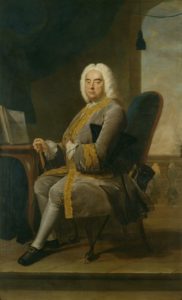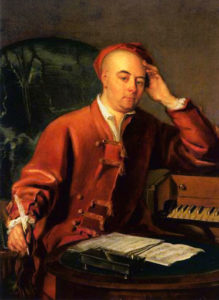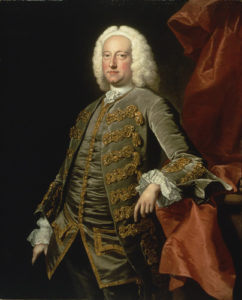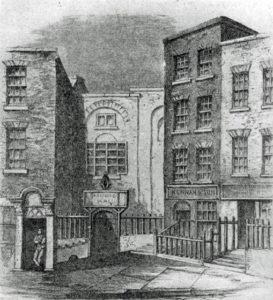We mark the first performance on April 13, 1742 – 278 years ago today – of George Frederick Handel’s Messiah in Dublin, Ireland.

Messiah is not just Handel’s most famous work, but one of a handful of “most famous works” in the entire Western musical repertoire. According to the American musicologist Joseph Kerman, Messiah is:
“the only composition from the Baroque Era that has been performed continuously – and frequently – since its first appearance.”
(I typically take comments like that one – even from someone as unimpeachable as Joseph Kerman – as a challenge. But having thought about it, I’ve concluded that Kerman is correct; Messiah is a singular work, one with an unbroken track record of frequent performances since its premiere, something we cannot say about any other musical work from the Baroque era. For example, the major works of Johann Sebastian Bach went unperformed for more than 75 years after his death. Vivaldi’s The Four Seasons, composed in 1716 and 1717 and published in 1725, fell into almost complete obscurity from the late eighteenth century until the 1940s, when it was recorded for the first time. Handel’s own anthem for chorus and orchestra – Zadok (pronounced “ZAY-dock”) the Priest – has been used at every English coronation since George II’s in 1727.
(An absolutely magnificent performance of Zadok the Priest by the Academy of Ancient Music, conducted by Richard Egarr, can be found at:
It’s longevity notwithstanding, Zadoc’s popularity can’t hold a candle to Messiah. Please; do we have Zadok the Priest singalongs planet-wide every Christmas time? And Johann Pachelbel’s seemingly ubiquitous Kanon, composed at some point between 1680 and 1706? It was utterly, absolutely, categorically forgotten until 1968, when the French conductor Jean-François Paillard recorded it with his chamber orchestra on a record released in June of that year on the Erato label.)

My Music History Monday post for February 19, 2018 – titled “A Model Citizen” – took note of the day in 1727 when the nearly 42-year-old “Georg Friedrich Händel” was transformed into George Frederick Handel when he became a naturalized British subject by order of the crown. That post focused on Handel’s early life and education and, having first arrived in London in 1710, his ongoing relationship with the English Royal Family. Handel became the go-to composer whenever the royal establishment required suitably grand music for special occasions; while it might be cliché, it is no exaggeration to say that Handel’s royal commissions provided the soundtrack for the Hanoverian dynasty of George I, II, III, and IV.
But it wasn’t just the English crown that adored Handel’s magnificent musical surfaces and fervent expressive sensibility. The English middle class and aristocracy adored his music as well, and more than any other single composer, it was the German-born, Italian-trained Handel whose music has shaped English musical tastes to this very day.
When the 25-year-old Handel first arrived in London in either November or December of 1710, Italian-language opera, which had been introduced to London in 1705, was just gaining traction with upper-crust English audiences. Within weeks of arriving in London, melodies drawn from Handel’s opera Agrippina – which had produced in Rome the previous year – were outfitted with new words and successfully inserted into other operas then being performed in London. In what was a stunning artistic coup, Handel managed to ingratiate himself to the English public, the aristocracy, and the royal family almost overnight.
Having taken up permanent residence in London in 1712, Handel went into the business of composing and producing Italian-language operas, which were then all the rage among the upper classes of Europe. He composed and produced over 40 such operas, making and losing several fortunes along the way. His final Italian-language opera, titled Deidamia, played just three performances in January and February 1741, after which Handel regretfully said ciao to what was a dying genre there in England.
You see, English tastes were a’changing. Back in 1728, John Gay and Johann Pepusch created and produced a satirical English-language opera titled The Beggars Opera that ridiculed the overblown musical and dramatic affectations of Italian-language opera. The growing English middle-class, the money and tastes of which were in the process of altering forever the cultural landscape in ye merrye olde England, loved the English language stuff, and by the mid 1730s, Handel could read the writing on the opera box wall. Even as he continued to write and produce Italian operas, he began to compose and produce English-language oratorios: operas based on religious subjects that were not staged but rather, performed in concert. The great success of his oratorio Saul, which opened at London’s King’s Theatre in the Haymarket on January 16, 1739, followed by that of the oratorio Israel in Egypt, which opened three months later on April 4, 1739, also at the King’s Theater, convinced Handel that the future was not just in plastics, but English-language oratorios as well.

The person who wrote the words – the libretto – for Handel’s oratorio Saul (and very like Israel in Egypt as well) was an English landowner and dilettante named Charles Jennens (circa 1700 –1773), whose wealth allowed him to dabble in his hobbies: religion, literature, and music. Those hobbies were well combined in his libretti for Handel, and never more so in a project he had in mind for 1741. On July 10 of that year, Jennens wrote in a letter to his friend Edward Holdsworth:
“Handel says he will do nothing next Winter, but I hope I shall persuade him to set another Scriptures Collection I have made up for him, and perform it for his Benefit during Passion Week [or “Holy Week”, the week prior to Easter, 1742]. I hope he will lay out his whole Genius and Skill upon it, that the Composition may excel all his former Compositions, as the Subject excels every other subject. The Subject is Messiah.”
Handel never committed himself to compose anything without first lining up a performance. As such, it was a case of perfect timing when at just the time Jennens was presenting his libretto for “Messiah” to Handel that Handel was contacted by an English diplomat in residence in Dublin named Lord William Cavendish. On behalf of several local charities, Cavendish invited Handel to come to Dublin and take part in the spring of 1742 “season of oratorios” (meaning during Lent). Handel loved the idea: he would be dealing with a new audience, helping three charitable causes, and would be giving series of concerts and not just the one off suggested by Jennens. And he had Jennens’ spanking new libretto in his hands to set to music for the occasion.
(For those of us asking “why Dublin?”, we’d observe that in those pre-Industrial Revolution times, Dublin was the second city of the British Isles after London and was a center of arts and education. Having said that, Londoners – snobs that they were/are – tended to look down at their “second city”; Dr. Samuel Johnson rather chauvinistically wrote that:
“Dublin, though a place much worse than London, is not as bad as Iceland.”)
Starting on August 22, 1741, Handel did what still seems to have been the impossible. Over the course of the next 24 days, he composed Messiah in its entirety, completing the 259-page autograph score on September 14, 1741.
Of Messiah, the conductor and Handel biographer Christopher Hogwood writes:
“The present day standing of Messiah makes it difficult for us to realize that for Handel its composition was an offbeat venture, unsure in it rewards and probably unrepeatable. It is the only truly ‘sacred’ oratorio he ever wrote, it was the only one performed in his lifetime in a consecrated building, and yet it was intended, in Jennens’ words, as ‘a fine entertainment.’”
We would add here that despite the fact that Handel was a man of the theater, Messiah contains no theatrical action; there are no factions at war with each other (Hatfields versus McCoys, for example), no named characters, and no conflict between protagonists. What dramatic action there might be is inferred and revealed only indirectly.
Of course, these aspects of the libretto were of Jennens’ makings, but Handel was apparently satisfied with the libretto “as is”, even though it would seem to have gone against his instincts as a dramatist. It is most likely that Handel was swept up by the sheer scope of the libretto, which progresses through the entire divine scheme, from the Prophecy of the Messiah’s coming, to the Nativity, Crucifixion, Resurrection, and Ascension, and finally to the assurance of Redemption. As has been pointed out, Messiah “encompasses all the major festivals of the Christian year.” Handel himself believed it was most appropriately performed at Easter, but as we all are aware, it is now most often performed during the Christmas season, particularly here in North America.
The premiere of Messiah was initially scheduled for April 12 but was delayed for a day “at the desire of several Persons of distinction,” the identify of whom remains unknown.

By modern standards, the performing forces at the premiere were quite modest. Handel, knowing that the premiere was to take place in Dublin, and not being intimately familiar with the abilities of the local musicians, kept the orchestration simple: strings (an unknown number of which played the premiere), two trumpets, kettle drums (timpani), a harpsichord and an organ. The chorus, drawn from the choirs of two local cathedrals, consisted of 16 men, 16 boys, and two women soloists: the celebrated English contralto Susannah Cibber and Christina Maria Avoglio, an Italian soprano drawn from Handel’s opera company. Handel himself played the organ and likely the harpsichord as well; he went so far as to have his own organ shipped to Ireland for the performance.
Based on a public rehearsal, a review in the Dublin Journal opined that Messiah:
“was allowed by the greatest judges to be the finest composition of Musick that ever was heard.”
The review of the premiere performance, which appeared in print on April 17, expanded on that sentiment.
“On Tuesday last [the 13th] Mr. Handel’s Sacred Grand Oratorio, the MESSIAH, was performed at the New Musick-Hall in Fishamble-street; the best Judges allowed it to be the most finished piece of Musick. Words are wanting to express the exquisite Delight it afforded to the admiring crowded Audience. The Sublime, the Grand, and the Tender, adapted to the most elevated, majestic, and moving Words, conspired to transport and charm the ravished Heart and Ear. It is but Justice to Mr. Handel, that the World should know, he generously gave the Money arising from the Grand Performance, to be equally shared by the Society for relieving Prisoners, the Charitable Infirmary, and Mercer’s Hospital, for which they will ever gratefully remember his Name. There were about 700 people in the room, and the sum collected amounted to about 400 pounds.”
If Handel’s Messiah has indeed been performed continuously since its premiere, so it has also been bent, folded, spindled and mutilated since that premiere: reorchestrated, enlarged and performed by increasingly gargantuan forces to the point of absurdity. Tomorrow’s Dr. Bob Prescribes post, which will appear on Patreon, will focus on the ongoing “recomposition” of Messiah and will then recommend both a HIP (“historically informed performance”/original instrument) recording as well as a full-blown, modern instrument recording.
Stay tuned.
Listen on the Music History Monday Podcast
Podcast: Play in new window
Subscribe: Apple Podcasts | Spotify | Pandora | iHeartRadio | RSS | More
